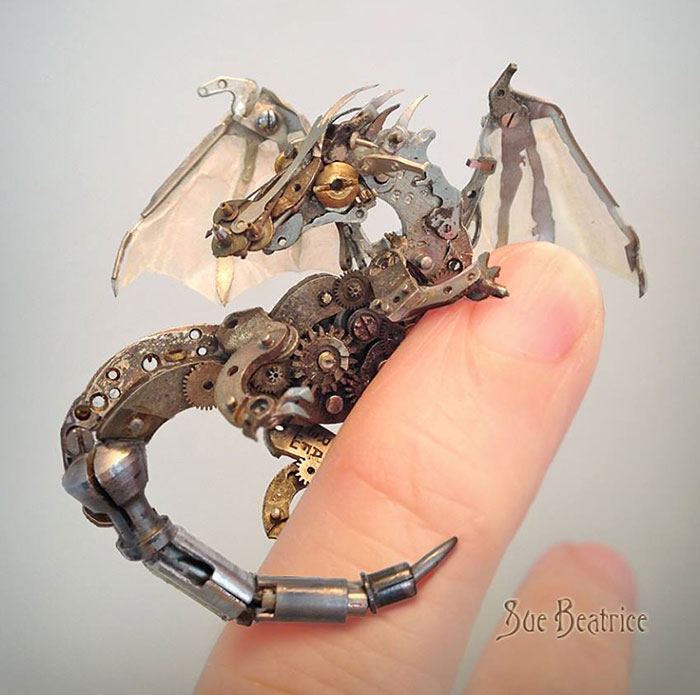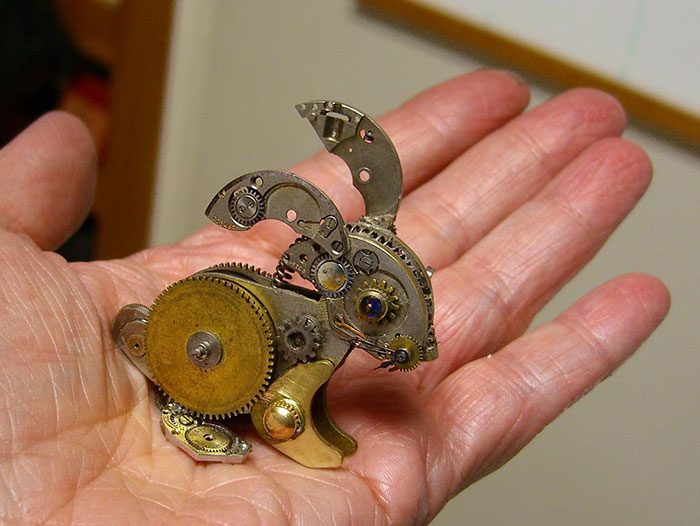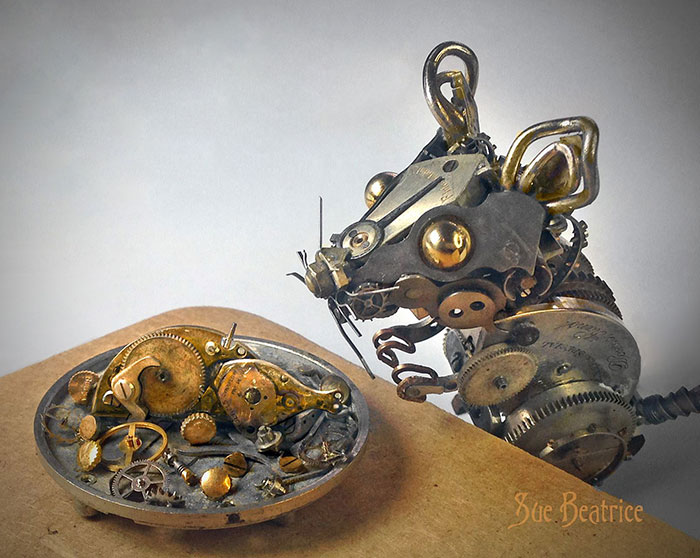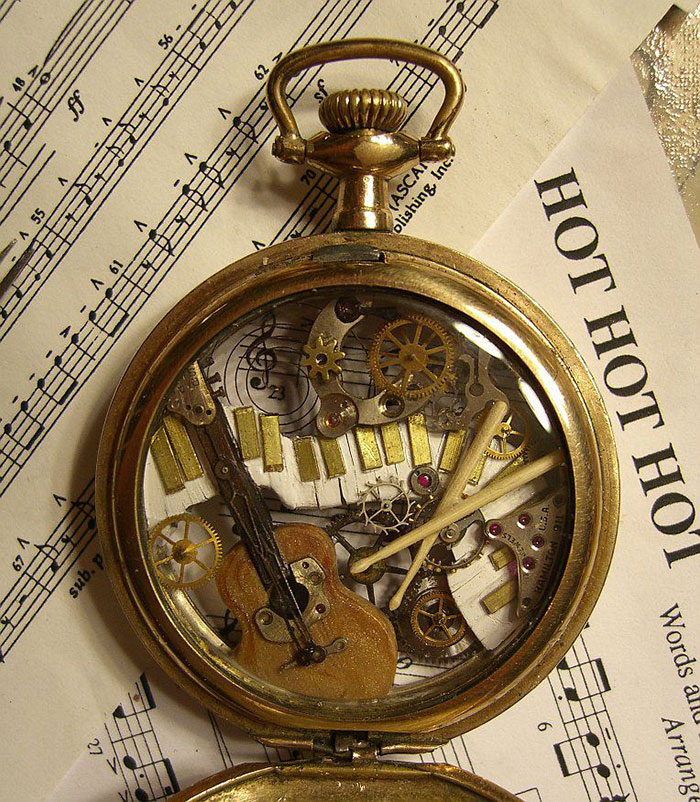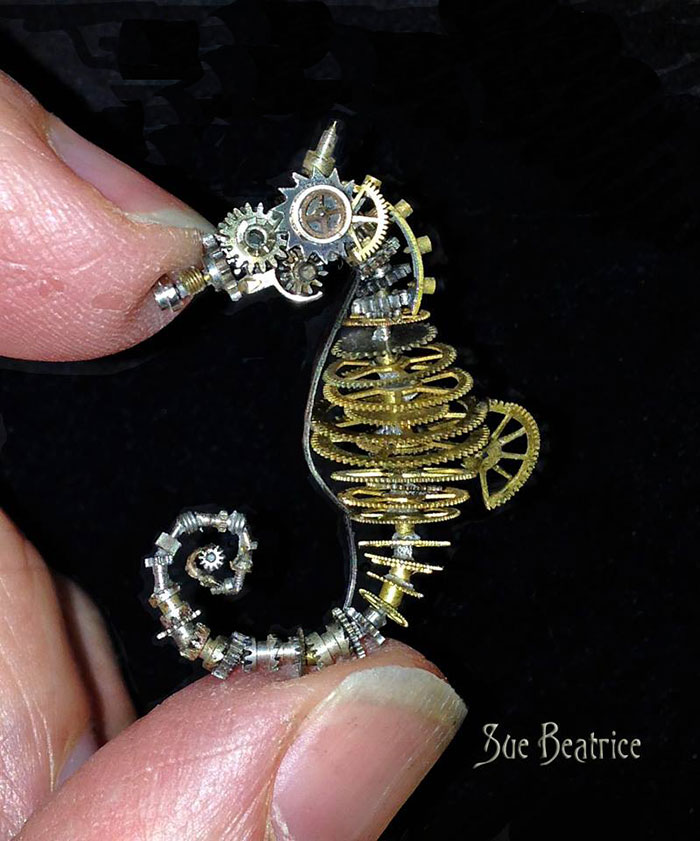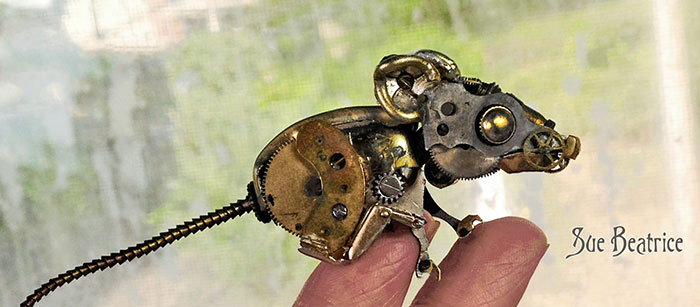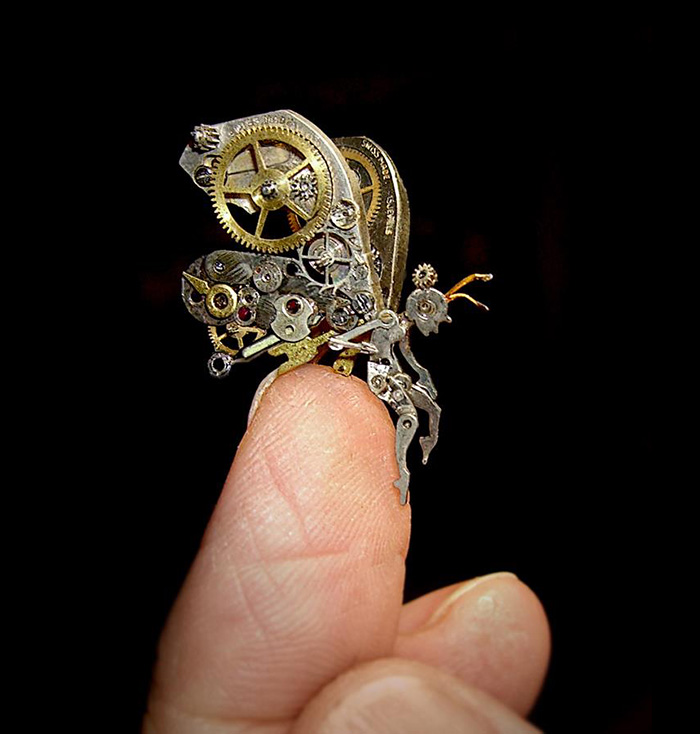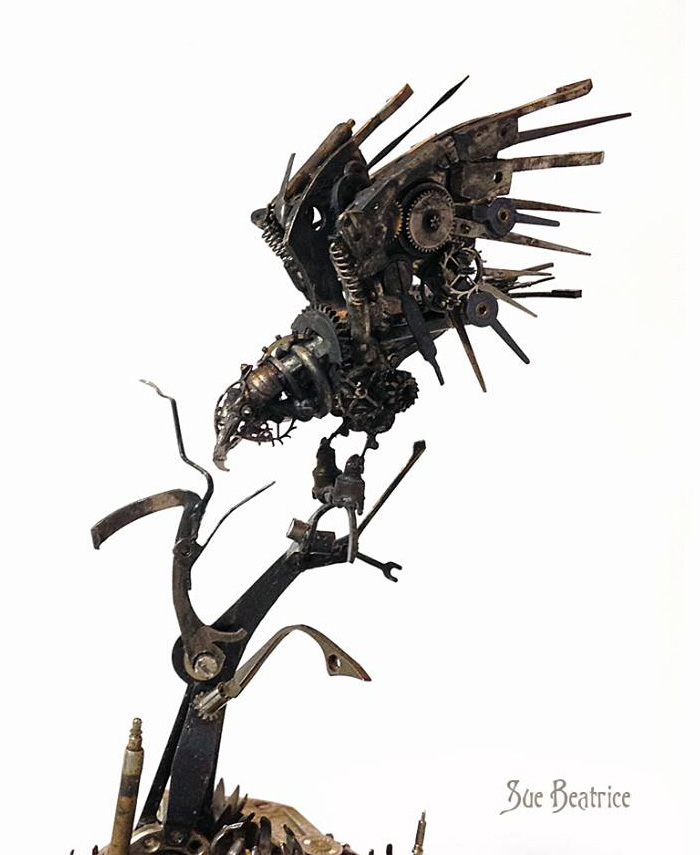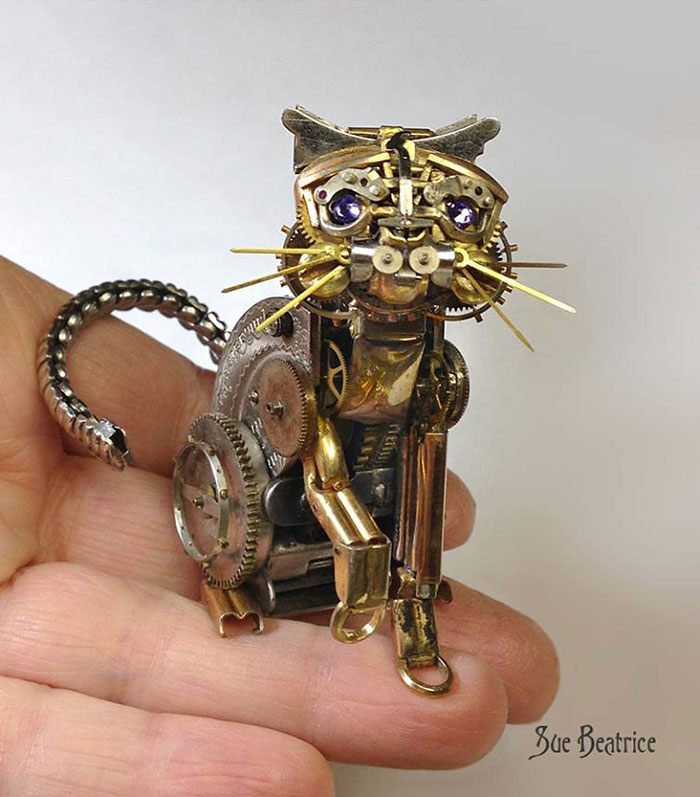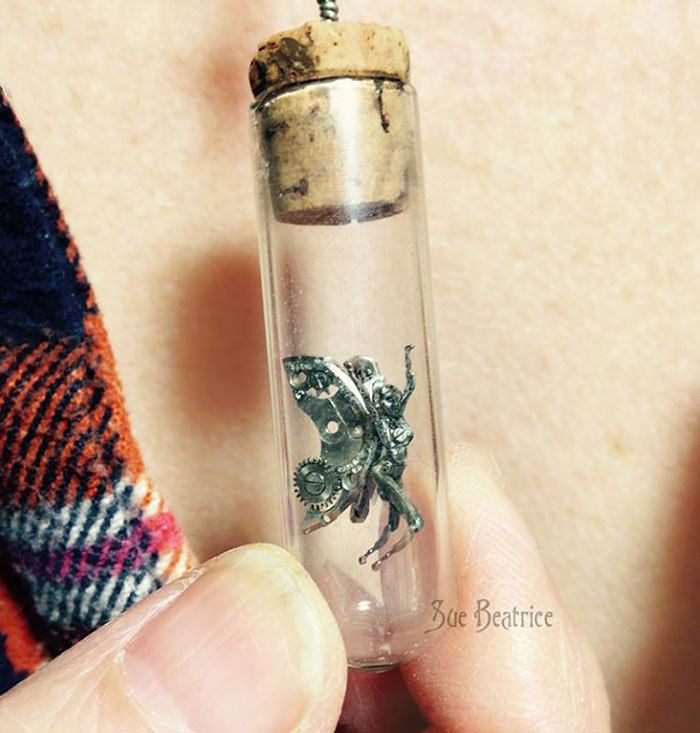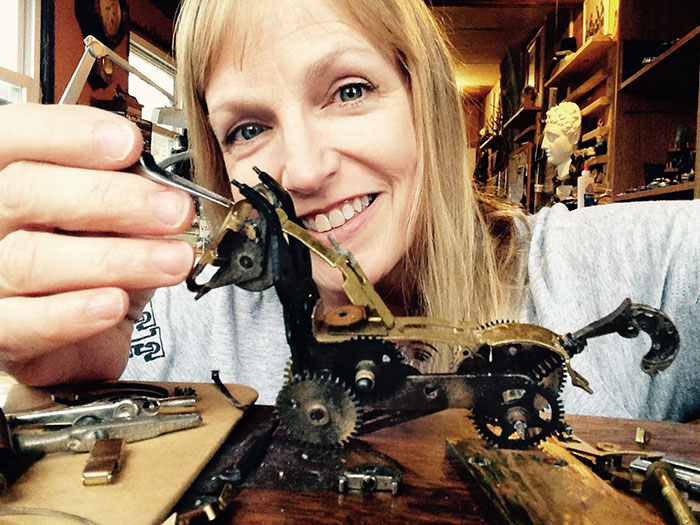Watch Parts Recycled Into Steampunk Sculptures
Old Watch Parts Recycled Into Steampunk Sculptures By Susan Beatrice
Susan Beatrice is an artist who recycles old vintage watch parts and turns them into beautifully intricate sculptures. This true jack-of-all-trades (whom we previously wrote about
here) is also a talented sand sculptor and painter, and uses her many talents to perfect her watch sculptures.
Beatrice writes that her recycled sculptures are “Earth-friendly and artistic items sensitive to the limits of our natural resources.” If you agree, be sure to check out her Facebook!
Tags: ........., 64GB USB stick, 720X120, academic research suffers, accessible technology, affordable open-source technology, air conditioning, alternative research, Apple Health, Apple Watch, arm, artist, audio waves, backs, bad heart, Ben Engel, biochem researcher, biohacking scene, biohacking. Neuroscientist, bit, blood pressure, Bluetooth headset implant, Bluetooth-enabled device, blurred vision, bodies, bodily chemicals, bodily functions, body art, body modification, body modification artist, body modification artists, body modification community, body modification people, body parts, bone-conduction hearing aid, brain figures, cable, calories, case, cell phones, change, Circadia, citizen scientist, citizen-science guinea pigs, cochlear implant, common cause, complex road, constant sleep-calibrating, consumer-driven products, cool experiment, coolest tech, cornea transplant, countertop citizen science, Courtesy, creative piercings, current obsession, cyborg phone calls, dangerous DNA sequences, dangerous pursuits, deaf people, deconstructed Bluetooth headset, deficit, devices, different chip implants, different parts, different sounds, different vibrations, different words, digital implants, digital life, DIY biotech, DIY cyborg community, doctor-prescribed machine, door, Dr. David Eagleman, Dr. Novich, Dr. Paul Bach-Y-Rita, Dr. Scott Novich, emergency rooms, environment, Erik Sprague, ethical implications, evolution, experimental platforms, experimental world, external operations, extreme aesthetic implants, extreme methods, extreme projects, Facebook, fact, familiar face, fellow biohackers, Fitbit, fringe body-mod community, funding climate, funding research, future, Gabriel Licina, galerie-sakura.com | Facebook, gastowntattoo.com | Facebook, gesture recognition, Goldilocks zone, GPS implants, green lights, group, group Grindhouse Wetware, hacker budget, hand signal, haptic feedback, healthcare industry, heart attack, heart rate, heavy bias, high-tech device, higher purpose, home, home labs, homegrown cyborgs, House, huge benefit, huge right, human, human body, image, implant surgery, implants, implants hum, inexhaustible bankrolling, inner ear, input output, internal biometrics, Internet, jamesdoranwebb.com | Facebook, jobs, journal Nature, Kickstarter campaign, large political events, legal blindness, legal liability, levels, Life, light version, likecochlear implants, lists, little bit, little sensors, lives, Lizardman, local weather, long distance, magic, magic wand, magnetic implants, magnetic switches, market-predicting cyborgs, massive companies, mature well-established fields, meaning, medical emergency, medical purposes, medical research, medical standards, mentally improve humanity, methods, mobile phones, Modern Medicine Little, new language, night, non-invasive technologies, norm, Northstar Version, O'Shea toldMic, ocular equivalent, old-school modification community, old-school world, open-source tools, organic self, p.m. meeting, parts, people, performance, performance artist, personal GPS, pesky ethical considerations, phone, physical apparatus, physical performance, platform, post surgery, Potato Head, potential breakthroughs, problem, problems, projects, proper laboratory procedures, Psycho Cyborgs, Purpose, real innovation, real time, real-time data, real-time information, rebels, recent experiments, recording device, red tape, regulatory systems, reptilian shape, Rich Lee, Ryan O'Shea, safer operating methods, safety regulations, Samppa Von Cyborg, scalpel jobs, school, science. Biohacking, self-described DIY, senses, sensory augmentation company, sensory substitution, sight-impaired test subjects, silicon-horn implants, silicone starfish.Source, similar labs, skin, skull, solenoid stimulators, Sound, sound travels, sound vibrations, sound waves, sound-transmitting magnets, split tongue, standards, Steve Haworth, stock market, subdermal implant, subdermal implants, surface, surgical centers, surgical implants, synthetic life, tablet, Tactile Image Projection, tattooed green scales, tech advances, technological implants, TED Talk, temporary night vision, text message, things, Tim Cannon, Tim Cannon.Source, time, times, tragus implants, transhumanists, Twitter, ultrasonic rangefinder, universal platform, unusual sensory channels, USB stick, Versatile Extra-Sensory Transducer, vest, vest mean, VEST works.Source, vibration motors, vibratory motors, video explainer, Vision Substitution, Von Cyborg, Von Cyborg Mic, way, wearer, wellness-tracking implications, Wi-Fi receiver, wireless tech, wish lists, work, World, xyz-ihs, You., Young Cyborgs, YouTube Cannon, YouTube Grindhouse, YouTube Meet, YouTube Neosensory, YouTube Steve Haworth, YouTube Von Cyborg, YouTubeHigh-tech health tracking, |LIKE2.4k Marilyn Manson

